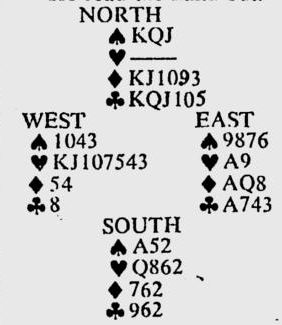The Sydney Morning Herald – Feb 27, 1972
When Humphrey Bogart in “Casablanca” says “Play it again, Sam,” he is handing out good advice to all bridge players, and especially to bridge writers. Before embarking on a line of play, it pays to check that no better line is available. One of the constant problems facing bridge writers is that claims such as “the contract was unbeatable” or “the only defence to beat the contract was :” have to be carefully checked. Sure as sure, observant readers will spot a line of play, missed by a cursory analysis.
So, not long ago, I was woken up by the jangling phone at the excruciating time of 10.30 one Sunday morning.
Bridge players are notoriously late risers, of course. I grunted some incomprehensible expletive. “Doug Maxwell here.” Doug was one of our top players, but has disappeared from the tournament scene.
“Have you seen the Forquet hand in this morning’s paper?’ I suggested that this was unlikely since I had yet to open my eyes. He read the hand out:

West was Pietro Forquet of the Italian Blue Team, the best team in bridge history. He landed in four hearts, doubled by South. North led the king of clubs, won with dummy’s ace of clubs and West showed top technique by ruffing a club immediately. Then a heart to the ace was followed by the nine of hearts, ducked by South. If South covers, the diamond finesse sees declarer home. The lead remained in dummy and declarer ruffed another club, bringing himself down to three trumps. Then the diamond finesse, the diamond ace and another ruff in hand left West with the K-J in hearts and three small spades.
He now merely exited -with a spade and waited for the last two trumps to bring in the ninth and tenth tricks.
“Very nice, Doug,” I said, stifling a yawn, “but I don’t see the point.”
“The point is that the writer then says that the hand could have been beaten by a very precise defence. “The defenders have to win three spade tricks and then switch to a diamond. “This is supposed to remove one of dummy’s entries prematurely, preventing declarer from shortening his trump length.
“But the hand can be made anyway. “Suppose the defenders do take three spade tricks and then play a diamond, won by dummy’s queen.
“Declarer now plays the nine of hearts from dummy and runs it (not unreasonable since South doubled). “Then he plays dummy’s 13th spade and ruffs it. “Then the ace of clubs and a club ruff, ace of diamonds and a club ruff. The ace of hearts and a club or diamond from dummy ensures West’s remaining KJ in hearts makes two tricks,” said Doug.
Suddenly I was wide awake. “Just a second, Doug,” I said. “What if the defenders don’t cash three rounds of spades, but only cash two rounds of spades before playing a diamond? “Now West can’t ruff a spade at once.
“If he gives up another spade, the defenders play another diamond, than certainly depriving dummy of the necessary entries.”
Doug answered: “It doesn’t matter. Suppose they take one or two spades and then play a diamond. “Dummy’s queen wins. The nine of hearts is run and wins. —Then ace of clubs, club ruff, ace of dia-monds, club ruff, ace of hearts, diamond ruff and West can exit with a spade, again waiting for the last two tricks to come home to roost.
“Fair enough?”
“Fair enough,” I said. “See you later, Doug.”
Now I couldn’t get back to sleep, as I played and replayed the hand trying to find a defence to beat the contract. I’m still searching.
Esta entrada también está disponible en: Spanish

